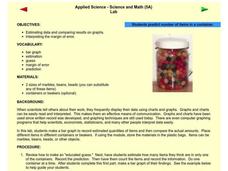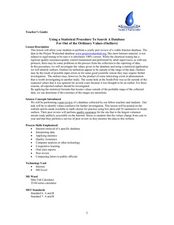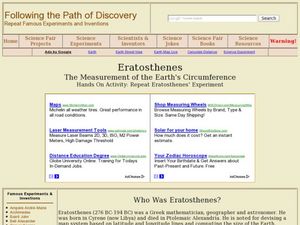Kenan Fellows
Density
Most scholars associate density with floating, but how do scientists determine the exact density of an unknown liquid? The third lesson in a seven-part series challenges scholars to find the mass and volume of two unknown liquids. Each...
Teach Engineering
Earthquakes Living Lab: Finding Epicenters and Measuring Magnitudes
Pairs use an online simulation to determine the epicenter and magnitude of an earthquake. Using real data about the earthquake's maximum S wave amplitudes, they then determine the magnitude. The resource provides a great career...
Curated OER
Applied Science - Science and Math Lab
Learners make a prediction. In this applied science lesson, students guess the number of items in a jar. Learners create a bar graph to show the predictions and the actual amounts.
Illinois State Board of Education
Solar System
Aspiring astronomers solve problems involving mixed units of the same attribute, including time, money, length, and area. They convert large numbers into scientific notation, then compute and compare ratios to explain why drawing...
Curated OER
Finding Fibonacci
Students study and apply the Fibonacci numbers and how they occur in nature. Students solve problems using the Fibonacci numbers.
Curated OER
Acceleration Lab
Young Einsteins experiment with the acceleration of Hot Wheels™ toy cars down inclined planes at various angles. This classic physics lab activity is thoroughly explained in both a teacher’s guide and a student lab sheet. Science...
Curated OER
Star Light...Star Bright
For this brightness of stars worksheet, students use a given formula using the temperature in Kelvins of a star to find its brightness. Students solve 4 problems using this equation.
Houghton Mifflin Harcourt
Random Samples: Estimating Population
With this estimating populations assignment, your class will learn about taking random population samples and calculating the average number of species in the samples to estimate the total population. Students use the given data to find...
Curated OER
Why Are Hot Things Red?
For this radiation and temperature worksheet, students use 2 methods to derive the Wein Displacement law that shows the relationship between the temperature of a body to the frequency where the Planck curve's value is at its maximum....
Curated OER
Demonstrating That Air Has Mass
Fourth graders demonstrate that air has mass. In this performance task, 4th graders design an experiment to demonstrate that air has mass. They will illustrate their demonstration and explain their findings.
Curated OER
The Math of Science-Balancing Chemical Equations
In this balancing equations worksheet, students are given directions as to how to balance equations and they practice what they learned. They complete three equations by placing the proper coefficients in front of the reactants and...
Curated OER
An Introduction to Heat Index
Students examine temperature and relative humidity readings from several says and then determine the heat index for those days. They compare their findings to those of their classmates.
Curated OER
Meet Geodesy-The Science Behind GPS
Students discover how a datum of reference points are used to to describe a location. In this Earth Science lesson, students will simulate how a GPS accurately determines the location of reference points within a datum.
Curated OER
Plot Your Course
High schoolers determine distance and direction on a nautical chart. In this nautical lesson plan, students identify obstacles and characteristics of common aid to navigation on a nautical chart.
Curated OER
How High Is That?
Students explore the National Spatial Reference System. In this vertical position lesson, students will discuss the use of vertical position data and solve practical problems involving geographic positioning.
Teach Engineering
Density Column Lab - Part 1
Mass and density — aren't they the same thing? This activity has groups use balance beams and water displacement to measure several objects. The pupils use the measurements to calculate the density of the objects.
Curated OER
Keep Your Eye on the Sky
Students examine the different types of satellites, cloud formations and weather patterns. In this weather lesson students use the Internet to research weather satellites, then write an article and create graphs.
Curated OER
PLANETS IN PROPORTION
Students discover scales for both the solar bodies' relative sizes and their distances from the sun. They find equatorial circumference and volumes of their solar bodies. Students apply estimation strategies and proportioanl reasoning to...
Curated OER
Using a Statistical Procedure To Search A Database For Out of the Ordinary Values
Students develop a spreadsheet containing formulas and find summaries for them. In this investigative lesson plan students choose a topic, investigate it and use MS Excel to sort data.
Curated OER
Brine Shrimp Feeding
Third graders study the diet of the brine shrimp. This is an introduction to a math measurement of a micrometer because of the size of the food brine shrimp feed upon. They make predictions about the types of food shrimp eat based on...
Curated OER
Discovering Density
Students explore the physical properties of density. In this hands-on lesson, students calculate density and distinguish between intensive and extensive properties.
Curated OER
Following Directions
Students explore the way astronauts practice and train to improve their efficiency in completing challenging tasks. They time and graph how long it takes to follow a list of directions. Also, they determine how practice and repetition...
Curated OER
Eratosthenes
Students examine what Eratosthenes is and the history behind him. In this earth lesson students complete a hands on activity to repeat Eratosthenes' experiment.
Curated OER
Gravitational Factors
Students identify the forces that affect the weight of an object. In groups, they determine the proper math model which can demonstrate the attraction between two objects based on gravity. They discuss the relationship between the weight...























